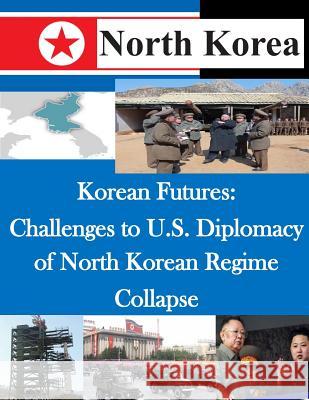Korean Futures: Challenges to U.S. Diplomacy of North Korean Regime Collapse » książka
Korean Futures: Challenges to U.S. Diplomacy of North Korean Regime Collapse
ISBN-13: 9781500493332 / Angielski / Miękka / 2014 / 44 str.
Korean Futures: Challenges to U.S. Diplomacy of North Korean Regime Collapse
ISBN-13: 9781500493332 / Angielski / Miękka / 2014 / 44 str.
(netto: 38,03 VAT: 5%)
Najniższa cena z 30 dni: 39,93
ok. 16-18 dni roboczych
Bez gwarancji dostawy przed świętami
Darmowa dostawa!
There is no shortage of plausible scenarios describing North Korean regime collapse or how the United States and North Korea's neighbors might respond to such a challenge. Yet comparatively little attention has been paid to the strategic considerations that may shape the responses of the United States, the Republic of Korea (ROK), Japan, China, and Russia to a North Korean crisis. These states are most likely to take action of some kind in the event the North Korean regime collapses. For the ROK (South Korea), North Korean regime collapse presents the opportunity for Korean reunification. For the other states, the outcome in North Korea will affect their influence on the peninsula and their relative weight in Asia. This study identifies the interests and objectives of these principal state actors with respect to the Korean Peninsula. Applying their interests and objectives to a generic scenario of North Korean regime collapse, the study considers possible policies that the principal state actors might use to cope with such a crisis. The goal of this study is to motivate policymakers to consider how the United States would respond to regime collapse, not to identify the most plausible scenario. It is the precrisis planning process that is necessary in order to develop a comprehensive understanding of the issues, choices, and priorities that will challenge U.S. diplomacy in the event of North Korean regime collapse. In particular, Washington must plan for the likelihood that while the United States and South Korea will seek to be the primary actors in a crisis induced by North Korean regime collapse, the actions of China and North Korea will profoundly influence U.S. decisions and room to maneuver. The United States will also need to gain the cooperation of Japan and Russia, as well as the support of the United Nations, to achieve politically acceptable outcomes. Regime collapse in North Korea is unlikely, especially in view of China's interest in preserving North Korea as a viable government and state. If it were to take place, however, North Korean regime collapse could fundamentally alter the strategic landscape in Asia, potentially in ways that would diminish U.S. influence in the region. Reduced American influence would constitute a serious, adverse turn of events for the United States. Asia is home to rising powers with which Washington must cooperate to set the global agenda in the 21st century. Continued American ability to shape the Asian strategic landscape will constitute a measure of U.S. power in the future and will be fundamental to achieving global stability, security, and prosperity.
Zawartość książki może nie spełniać oczekiwań – reklamacje nie obejmują treści, która mogła nie być redakcyjnie ani merytorycznie opracowana.











